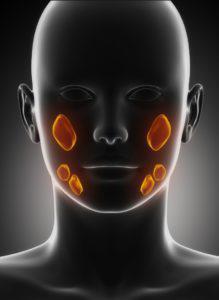
Do you have trouble swallowing? Is it hard for you to open your mouth widely? Are the muscles on one side of your face weak? These could all be signs of salivary gland cancer. Although this condition is curable, symptoms like these should be reported to your dentist as soon as possible to make it easier to treat. Read on to learn more about treatment for salivary gland cancer in Midtown East.
WHAT ARE SALIVARY GLANDS?
Salivary glands make saliva, more commonly known as spit. Saliva is a minor acid that helps begin the process of digesting food by breaking down food in the mouth. It also contains antibodies that help prevent infections in the mouth and throat.
There are 3 sets of major salivary glands which are located:
- Just in front of the ears
- Below the jaw
- Under the floor of the mouth and below either side of the tongue
In addition, there are several hundred minor salivary glands. These microscopic glands can be found:
- Under the lining of the lips and tongue
- In the roof of the mouth
- Inside the cheeks, nose, sinuses, and larynx (voice box)
HOW IS SALIVARY GLAND CANCER DIAGNOSED?
Some of symptoms of salivary gland cancer include:
- Swelling or a lump in the mouth, cheek, jaw, or neck
- Persistent pain in one or more of those areas
- Numbness in the face
- A difference in the size or shape of the left and right sides of the face
- Weak muscles on one side of the face
- Trouble swallowing
- Fluid draining from an ear
- Difficulty opening the mouth widely
Many of these signs can be indicative of a benign tumor instead of a cancerous one, especially if they are caught early. It’s best to see your dentist in Midtown East if any of these apply to you.
Your dentist will typically start by taking a physical exam of your mouth and the areas on the sides of your face and around your ears and jaw. If the results are determined to be abnormal, you might be referred to an ear, nose, and throat doctor. Your dentist may order imaging tests, such as:
- X-ray
- CAT scan
- MRI scan
- PET scan
These are all different methods of diagnosing the exact location and extent of a tumor. Your doctor might also suggest a biopsy, which involves taking a sample of tissue from the problem area and examining it under a microscope.
CAN SALIVARY GLAND CANCER BE CURED?
If found early enough, many salivary gland cancers can often be cured. Although curing cancer is the primary goal of treatment, preserving the function of the nearby nerves, organs, and tissues is also important.
Early stage cancers that are still confined to the salivary glands can usually be removed with surgery. Your surgeon may also remove lymph nodes on the same side of your neck to see if the cancer has spread. However, surgery may result in problems with eating, speech, or appearance. In that case, radiation therapy is another option.
Radiation treatment is the best option for more advanced stages of cancer, where the tumors have migrated to other areas besides the salivary glands, rendering them almost impossible to remove with surgery. Chemotherapy may be added as well, but its effectiveness is still being studied.
In the early stages before it has a chance to spread, salivary gland cancer is very treatable. The most important thing is to let your dentist know of your symptoms.
CAN I PREVENT SALIVARY GLAND CANCER?
Because most causes of salivary gland cancer are unknown, there are no definite preventative measures to take. However, there are a few things you can do to decrease your risk of oral health problems in general, including:
- Avoiding tobacco use
- Limiting alcohol consumption
- Eating a healthy diet
- Brushing your teeth twice a day
- Flossing once a day
The most important thing you can do to prevent problems like salivary gland cancer is to visit your dentist twice a year for regular checkups and cleanings. If you experience any of the symptoms listed, let your dentist know right away.
ABOUT THE PRACTICE
At the Midtown East Manhattan office of Dr. Aaronson & Associates, our goal is for our patients to leave informed and with a healthy smile. Drs. Theodore Aaronson, Sara Menashehoff, and Maxim Podolsky offer expertise in a wide variety of dental services. They screen for oral cancer at every biannual checkup to check for early warning signs of disease. For more information on how you can prevent cancer and oral health problems in general, click here or call (917)-722-6573.
